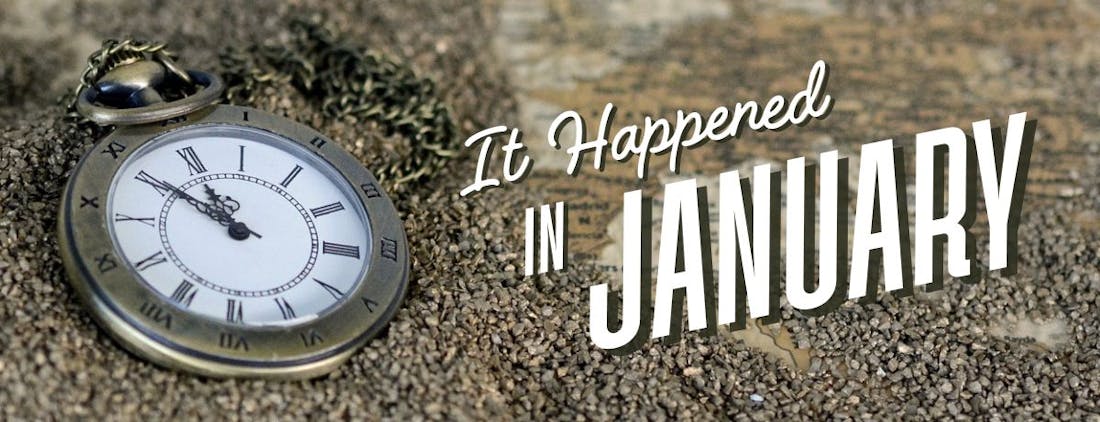
View Historical Events by Day: What Happened on January 31 in History?
Explore the historical events that shaped our world on January 31st. From major milestones to cultural achievements, see what happened on this day in history. Dates for earlier events may be approximate.
Note: Sources for the historical content shown, include research and reviews of relevant Online History Resources or printed material. When possible, we show a link to a source which provides additional or unique perspective about the event.
We do our best to provide accurate information but would appreciate being notified if any incorrect information is found. You may do so by using our Feedback link.
The Crusaders, besieged in Antioch, capture a tower, gaining a strategic advantage in the ongoing siege.
Crusaders begin constructing siege engines for the siege of Tripoli during the First Crusade.
William II of England's courtier and rumored successor, William de Warenne, dies, furthering uncertainties over succession.
Hugh d'Avranches, 1st Earl of Chester, a prominent Norman magnate in England, dies, impacting the power dynamics of the time.
Edward I of England summons Parliament, instructing on measures to raise funds for military campaigns.
Louis de Nogaret de La Valette becomes the Grand Master of the Knights Hospitaller after the death of Jean Parisot de Valette.
France's King Louis XIV suspends the Edict of Nantes, revoking the religious rights of Huguenots.
The Ashmolean Museum in Oxford, England, the world's first university museum, opens to the public.
King Charles II of England dies, and James II ascends to the throne.
Bonnie Prince Charlie's Jacobite forces defeat government troops at the Battle of Falkirk Muir in Scotland.
Treaty of Neah Bay: Makah Reservation established in US Territory of Washington for Makah nation, preserving tribal rights but ceding over 300,000 acres to the US government. More
The United States Congress passes the 13th Amendment, abolishing slavery and sends it to the States for ratification. The amendment passed 119 to 56, barely above the required two-thirds majority. Ratification from the States was received on December 1865, ending the institution of slavery in the U.S. with a final constitutional solution. More
U.S. President Harry Truman publicly announces his decision to continue and intensify research and production of thermonuclear weapons.(Hydrogen Bomb), a weapon theorized at that time to be hundreds of times more powerful than the atomic bombs dropped on Japan during World War II. Five months earlier, the Soviet Union successfully detonated an atomic bomb. Then, several weeks after that, British and U.S. intelligence came to the staggering conclusion that German-born Klaus Fuchs, a top-ranking scientist in the U.S. nuclear program, was a spy for the Soviet Union. More
The first official TV broadcast in Canada takes place in Montreal.
The United States enters the space age by launching its first satellite, Explorer 1.
The first McDonald's restaurant in the Soviet Union opens in Moscow's Pushkin Square.
The World Health Organization (WHO) declares the COVID-19 outbreak a global health emergency.
The United Kingdom officially leaves the European Union, implementing Brexit.
The UK surpasses 100,000 COVID-19 deaths, becoming the first European country to reach this grim milestone.
The International Criminal Court's jurisdiction is extended to cover war crimes in the occupied Palestinian territories, angering Israel.
NASA's Mars rover, Perseverance, lands successfully on Mars, beginning its mission to search for signs of ancient life.
Myanmar experiences widespread internet shutdowns as the military government tightens control following the coup.
WHO approves the AstraZeneca/Oxford COVID-19 vaccine for emergency use, aiding global vaccination efforts.
The European Union introduces new export controls on COVID-19 vaccines amid supply shortages.






.png?auto=format,compress&fit=crop&w=280&h=280&q=93)







.jpg?format,compress&fit=crop&w=280&h=280&q=93)
.jpg?format,compress&fit=crop&w=280&h=280&q=93)



